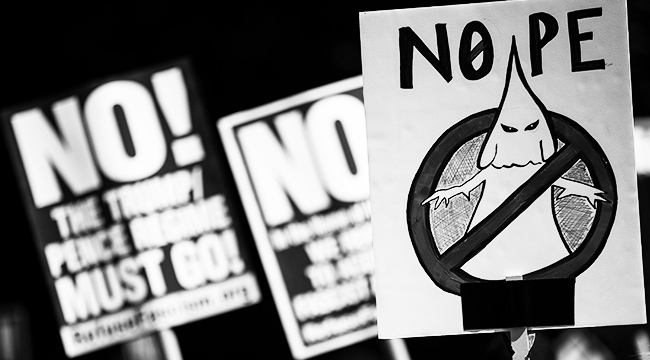“One cannot, at once, claim to be superhuman and then plead mortal error. I propose to take our countrymen’s claims of American exceptionalism seriously, which is to say I propose subjecting our country to an exceptional moral standard.”
― Ta-Nehisi Coates, Between the World and Me
Since the day the Emancipation Proclamation went into effect — January 1st, 1863 — white Americans (of which I am one) have taken half-measures to undo the ravages of racism. For 153 years, we’ve allowed our fellow white Americans to ease into the radical notion that humans are equal, that race itself is a myth, and that protection and representation should not be calibrated based on pigmentation. We’ve allowed equality to be the apple dangling in front of anyone who is not us, parceling out bites when we see fit.
Along the way, we’ve marveled at our own magnanimity, and been shocked when others don’t shower us with credit. There is some math to this: Whether by the fault of those who raised us, society at large, or our own personal failings, we’ve learned to take up more space in this nation than we proportionally deserve. Over the course of our lifetimes, we’ve come to believe that our whiteness makes us our existence particularly relevant to the order of the universe. This explains, among other things, why the local newspaper column in which an elderly person prattles on about muffins and rascal grandchildren is inevitably written by a white person: Forget lives mattering, privilege has convinced us that our most mundane mundanities matter.
In 2017, the apple that white people hold in front of literally everyone else is getting smaller. Its rotten core has been revealed. Moreover, society at large is calling out the apple, plus the branch, and string that we use to tie our little oppression-machine together. In doing so, they are weakening it. The greatest fear of white people was never that we’d run out of apple to dangle — after all, we’d created a colossal apple when we systematically oppressed all non-white males for hundreds of years. The greatest fear was that our victims would realize: “This apple is dumb and tastes weird and I DON’T NEED IT.”
And now, three paragraphs in, you’re saying “but not all white people.” And as the writer, I too am saying “but not all white people! Look at this very essay! Look at how extraordinarily woke I am!” Which is as good a time as any for white people, myself included, to learn about “systems thinking.” If we truly consider ourselves part of a larger society, rather than just lone individuals navigating life in a vacuum, we quickly realize that none of us can divorce ourselves from the privilege our skin endows upon us. Which… tough shit. Because people of color have not been able to divorce themselves from the lack of privilege that their skin has endowed upon them, something that is, quite obviously, way worse with far more dire consequences.

As white people, we have — whether we like it or not — benefited from gross inequality based on our skin. It’s only natural that we should feel morally obligated to be part of the solutions. In this pursuit, we’ll have to admit that we — the non-oppressed — do not get to set the terms or timetables for ending oppression. Nor do we get to gripe at the travails of our journey from “terrifically over-privileged” to “slightly-less but still terrifically over-privileged.” No, to be allies, we will have to supply something which white people famously struggle with: Listening. We must learn more about the experiences of others, because our experience is all we know and our experience was literally formulated — hundreds of years ago but extending on and on and on — around the belief that we are somehow “more than.”
But first, before we launch into a journey of reconciliation (one which should be heralded by flags depicting our closed mouths and open ears), there is one thing we must say: “I condemn white nationalism, Nazism, the Klu Klux Klan, and all other groupings of white people which feign innocence while actually housing a belief that the nation’s arc towards equality is somehow a bad thing.” Or, just like, “Fuck Nazis.” We have to say that. Loud and emphatically. It is ground zero, which is sad, but is also — as Charlottesville revealed — the reality of this moment in history. Vocally rejecting hate groups is an absolute moral imperative for any white person who wants to support equality. There is no counterpoint, there’s nothing left to argue.
But of course we will argue — in the comments section, social media, and on TV:
“I don’t need to condemn it,” we say. “It’s implicit and obvious. Of course I do!”
“Do what?” they ask.
“The thing you said!”
“Condem Nazism, Racism, etc.?”
We look at our feet and perhaps kick a dirt clod. “Yeah… that thing…I mean, all sides. There are many sides.”
Wrong. The goodwill of white people has only ever been implicit to ourselves. To everyone else, we are malevolent. To everyone else, we are the danger — overtly or covertly. We are the monster that terrorizes the countryside, leaving our caves to snatch children and lay waste to cities (see: lost generation; red-lining).
Yes it is sad that in 2017 we all have to condemn white supremacist groups veiled so thinly as something else that the fibers are absolutely translucent. But it’s far worse that these groups exist. And since we — white people — have directly benefitted from the systems that empowered bigotry in the first place, we must have an active role in their destruction.
Anything else is unspoken discrimination. Anything else is silent oppression.

In order to meet the exceptional moral standard that Coates writes about iabove, white people must call hate groups out by name. We must condemn them vocally, across platforms, and out in the real world. We must be unflinching in our belief that all systems and groups created to maintain the absurd notion of white supremacy are a plague upon this country. Nothing else will satisfy. No more half-measures.






